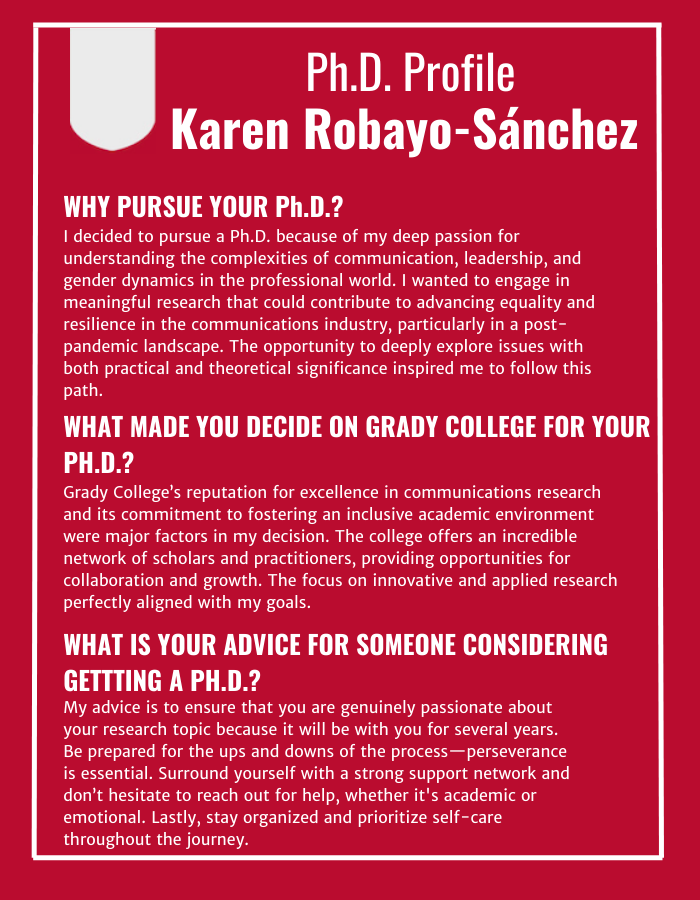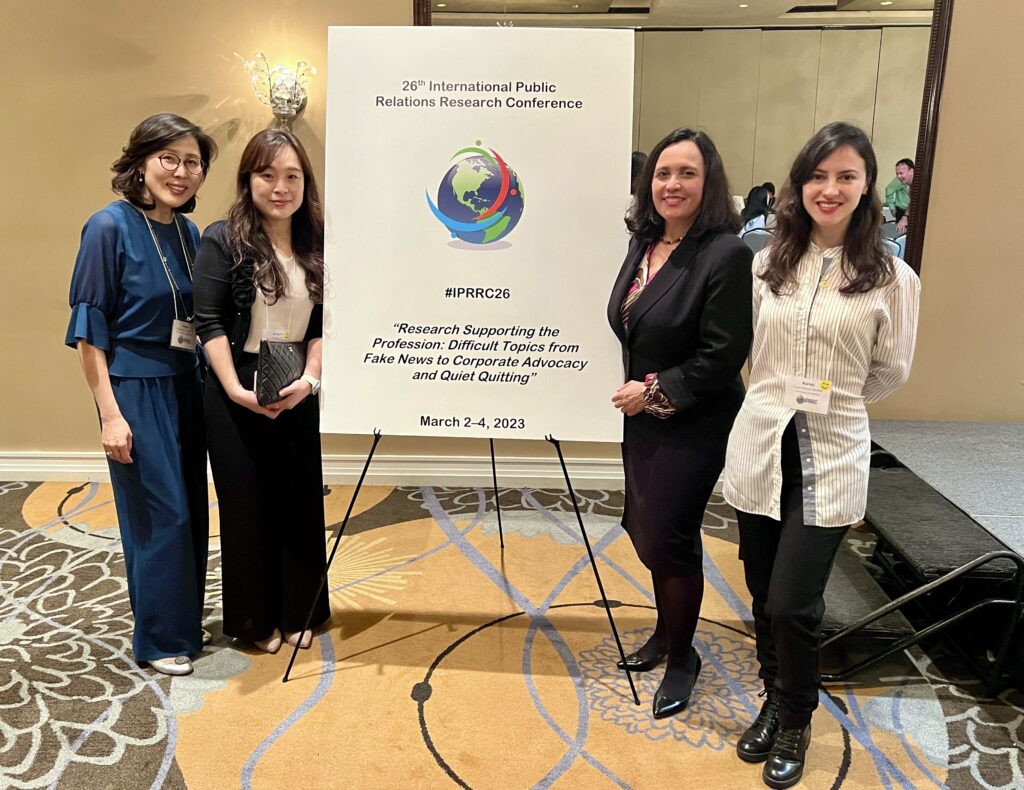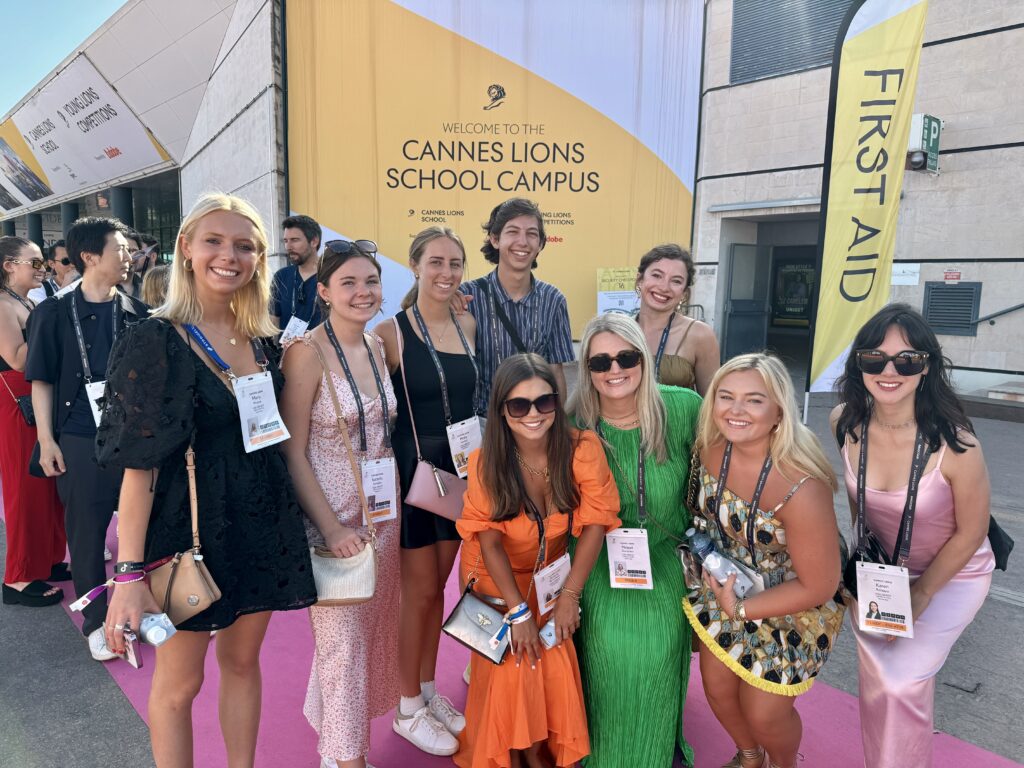Ph.D. Profile – Karen Robayo-Sánchez

Ph.D. Profile – Karen Robayo-Sánchez

Karen Andrea Robayo-Sanchez is a Ph.D. student in mass communication and public relations studies at the University of Georgia. Her research interests are international communication, leadership, gender equality and intersectionality. Through collaborative research and comparative studies, she wants to contribute to bridge the gap between the countries of the Americas and contribute knowledge that serves both to the academic and the industry field.
Prior to attending Grady, Karen practiced journalism for 5 years in Bogotá, Colombia. Her experience includes working in governmental agencies and a national public channel, covering economic, current affairs, peace discussions, agricultural census, food safety, among others. Karen enjoys dancing Latin music and is interested in learning about other music and cultures.
Robayo-Sanchez earned a master’s degree in mass communication from University of Georgia and a bachelor’s degree in journalism and mass communication from Universidad Central de Colombia, Bogotá, Colombia.
Following is a brief interview with Karen Robayo-Sánchez .
What made you decide to pursue your Ph.D.?
I decided to pursue a Ph.D. because of my deep passion for understanding the complexities of communication, leadership, and gender dynamics in the professional world. I wanted to engage in meaningful research that could contribute to advancing equality and resilience in the communications industry, particularly in a post-pandemic landscape. The opportunity to deeply explore issues with both practical and theoretical significance inspired me to follow this path.
Please provide a brief explanation of your dissertation topic and why it’s important to you.

My dissertation, titled Empathetic Leadership and the She-Cession: Advancing Gender Equality and Resilience in Communications, examines how empathetic leadership styles impact communication professionals, especially in the context of the She-Cession triggered by the COVID-19 pandemic. This research is important to me because it not only explores leadership in a rapidly evolving industry but also addresses gender equity and mental well-being—issues that align with my commitment to creating more inclusive and supportive workplaces for women.
What other projects (research, teaching, or otherwise) have you been involved with as a doctoral student?
In addition to my dissertation, I’ve been involved with two research labs. One is the Social Media Engagement & Evaluation Suite (SEE Suite), directed by Dr. Itai Himelboim. This innovative space is designed for students and researchers to gain the skills, experience, and knowledge needed to become leaders in the evolving social communication ecosystems. We use social media analytics tools like Brandwatch and NodeXL to analyze communications from companies and non-profit organizations.
Additionally, I’ve been working on a Body-Worn Camera project, which is a team effort between the Brain, Body, and Media (BBAM) lab, directed by Dr. Glena Read, and the Digital Media Attention and Cognition (DMAC) lab, directed by Dr. Bart Wojdynski. These labs support psychophysiological research and feature sophisticated equipment for eye tracking and facial expression analysis.
I’ve also enjoyed teaching undergraduates in media studies and public relations, which has allowed me to contribute to the education of the next generation of communication professionals.
What has been the highlight of your doctoral education so far?
There have been many memorable moments throughout this journey. Every class has been an eye-opening experience that has contributed significantly to both my professional and personal growth. Attending conferences has enriched my social and professional network, allowing me to connect with inspiring individuals.
One of the most life-changing experiences has been participating in international programs like Cannes Lions and receiving a scholarship from CANNES Professional Development to complete the training for my Certified Associate in Project Management (CAPM) certification. These milestones have not only added new dimensions to my research but also expanded my professional network, allowing me to apply project management principles in both academic and real-world settings.

What advice would you offer to someone considering a Ph.D. program?
My advice is to ensure that you are genuinely passionate about your research topic because it will be with you for several years. Be prepared for the ups and downs of the process—perseverance is essential. Surround yourself with a strong support network and don’t hesitate to reach out for help, whether it’s academic or emotional. Lastly, stay organized and prioritize self-care throughout the journey.
What is a fun fact about yourself, your research field or other related fields?
Grady College’s reputation for excellence in communications research and its commitment to fostering an inclusive academic environment were major factors in my decision. The college offers an incredible network of scholars and practitioners, providing opportunities for collaboration and growth. The focus on innovative and applied research perfectly aligned with my goals.
Author: Lauren A. Pike, lauren.pike@uga.edu